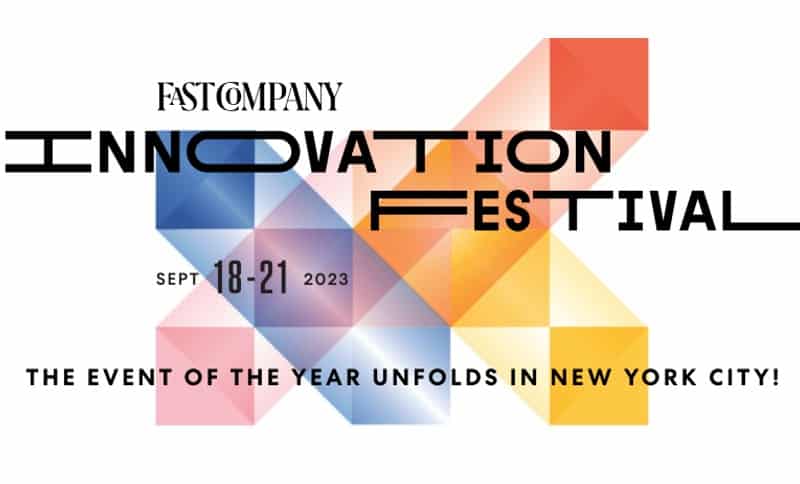Live from New York, the 2023 Fast Company Innovation Festival has convened the world’s most exceptional innovators, entrepreneurs, and creative thinkers at Manhattan’s Financial District for their 9th annual event. Celebrity headliners include Halle Berry, Gabrielle Union, Tracee Ellis Ross, and Christy Turlington Burns.
The Festival kicked off on Monday with the opening of their “Fast Tracks”, a field trip of open doors across Manhattan, welcoming attendees into the offices of some of the world’s greatest brands.
Panels and headline speakers commenced on Tuesday. The Mediaweek team was on the ground to attend a number of these sessions throughout the day. Here is a recap of some of the highlights:
The World According to Ray Dalio
Lauded American investor and entrepreneur, Ray Dalio, founder of the world’s biggest hedge fund firm, Bridgewater Associates, was joined on stage by Ainsley Harris, senior writer at Fast Company.
The interview, conducted by Harris, drew its inspiration from Dalio’s most recent publication, Principles for Dealing with the Changing World Order: Why Nations Succeed or Fail, in which Dalio draws from his study of world history to anticipate future forces that he predicts will change the world in our lifetime.
Dalio explained, “I studied the last 500 years, in order to understand what’s going to happen tomorrow. And those forces, though, showed this pattern of the rise and declines, and why they happen.”
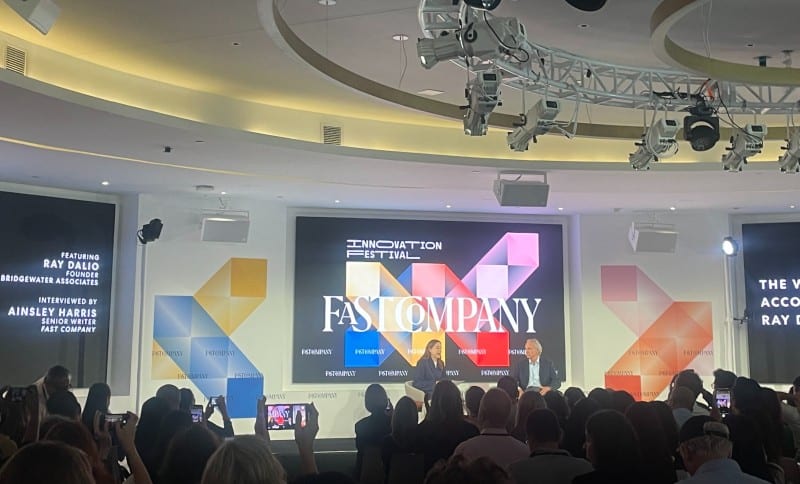
Supposedly talking to an American audience, these forces include enormous increases in debt and the monetisation of debt, unprecedented internal conflicts, and the power of international conflict. An overview of these principles can be found here.
Though the listed predictions painted a rather stark picture of the world, including the ESG debate being “one of a large number of issues where there are irreconcilable differences” and America’s “frightening lack of belief in the decision-making systems, including the legal systems” which is a characteristic harbinger of past civil wars, Dalio did assure the audience, “I have a principle: if you worry, you don’t need to worry. If you don’t worry, you need to start worrying.”
It’s in the Bag: How Clare V. Became a Culturally Conscious Cult Brand Supporting Maternal Health
Moderator Liz Segran, senior writer at Fast Company, hosted Clare Vivier, founder, CEO, and creative director of the cult handbag brand, Clare V., and Christy Turlington Burns, American model, and founder of NFP Every Mother Counts, an organisation dedicated to fighting for the rights of individuals to have equitable access to pregnancy-related healthcare.
The two have been long-term collaborators, but as individuals, both Turlington and Vivier exemplify the effectiveness of leveraging established followings and communities to elicit action towards issues that matter to them. In this case, the focus was on injustices in healthcare and reproductive rights. The discussion however broadened to “performativity in the business world” in general, and how even the smallest of startups can get involved in activism, if just through the dissemination of knowledge via their community channels.
That being said, Turlington acknowledged the tension that exists for brands (including personal brands) who want to make an impact needing to “narrow it down a bit… to really build that credibility, and to take the time to become an expert or to become an informed advocate to be able to use your voice.
“But it doesn’t mean that when something comes up that breaks my heart that I don’t still want to post something about it, and that could be perceived as performative.”
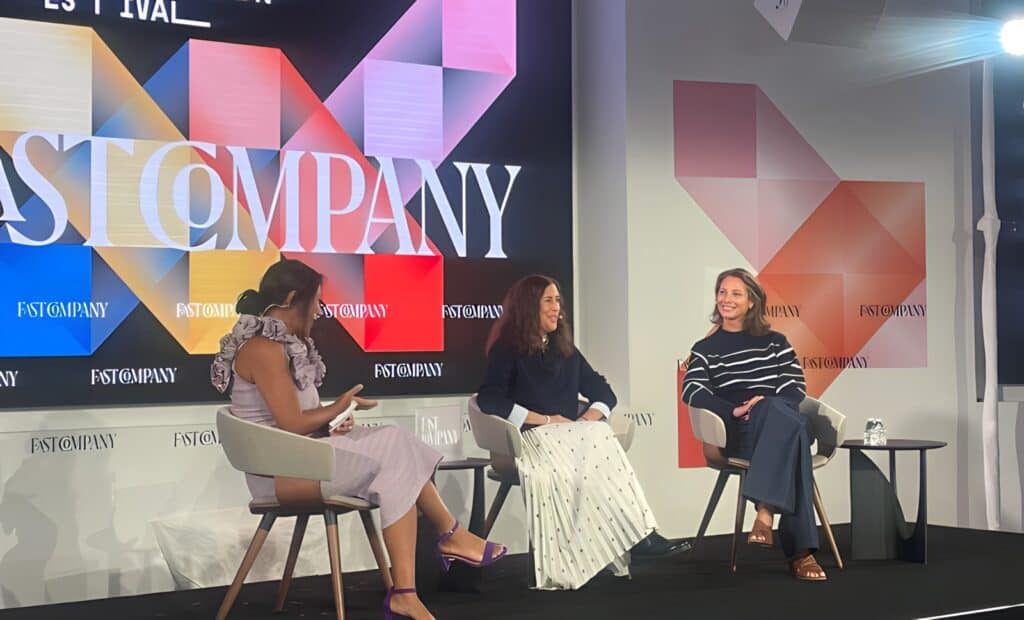
Vivier, who like Turlington, has been outspoken about the ongoing abortion debate in America. When asked what gave her the confidence to speak out at the risk of alienating her customer base, Vivier responded:
“Certain forces in this country are making the conscious decision to work against women’s healthcare. I think that’s wrong. So I’ll stand on that hill and shout from the rooftops, whatever I have to do, because I have a voice.
“I think that customers are respecting that more. They have so much choice these days – you can buy a bag from anyone. So am I going to alienate some customers? Perhaps. But I’m also going to gain respect from other people who have a wide choice of where to buy any kind of carryall.”
Turning Setbacks into Comebacks: How Slutty Vegan’s CEO Built a Multimillion-Dollar Food Empire
Pinky Cole, founder and CEO of the plant-based Slutty Vegan restaurant chain, joined Julia Herbst, senior editor at Fast Company for a session that was all about failure, resilience, and personal growth.
The session is aptly in the countdown to the release date of Coles’ latest book, I Hope You Fail: Ten Hater Statements Holding You Back from Getting Everything You Want.
Cole, who just recently cracked the Time100 list, shared with attendees the lessons she has learned on her turbulent road to success as a self-made entrepreneur, including listening to your inner-voice when it comes to decision making, brand-building, team management, and her current challenges to achieve scalability while keeping true to her brand values of inclusivity and love.
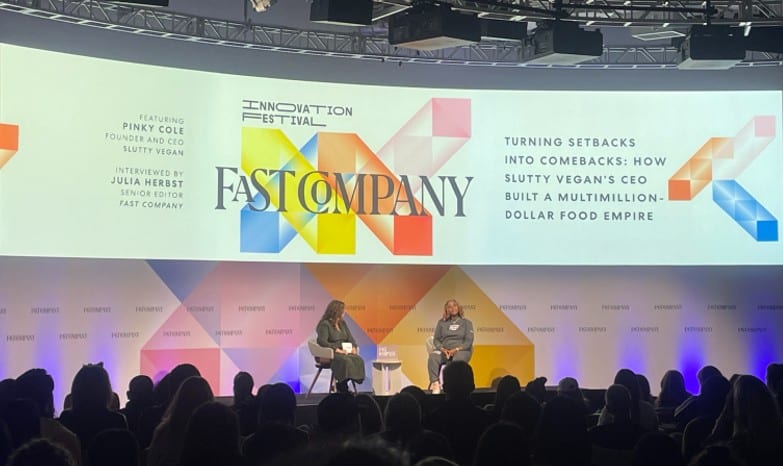
“One of my biggest challenges is scaling culture,” Cole described. In one of her most candid revelations about the future of her business, the author revealed, “I’m at a fork in the road, right? I can be this popular entrepreneur that people know, or I can continue to build this iconic movement.
“In order to do that, I got to put people in place that can really scale the business in a way that I can’t. And most CEOs can’t be honest about that.”
Leaving the audience with a final thought, Coles encouraged, “Being an entrepreneur is not easy. But always remember in the moments we feel like giving up because of failure or the things that seem hard: what is your why? What is your intention?”
Navigating the New World of Work with Slack CEO Lidiane Jones
Slack CEO Lidiane Jones closed the day as final headline speaker, interviewed by Fast Company’s global technology editor, Harry McCracken.
In a post-COVID world it’s easy to forget the productivity transformation that Slack was already inspiring in the workplace before the term “hybrid workplace” was part of the corporate vernacular.
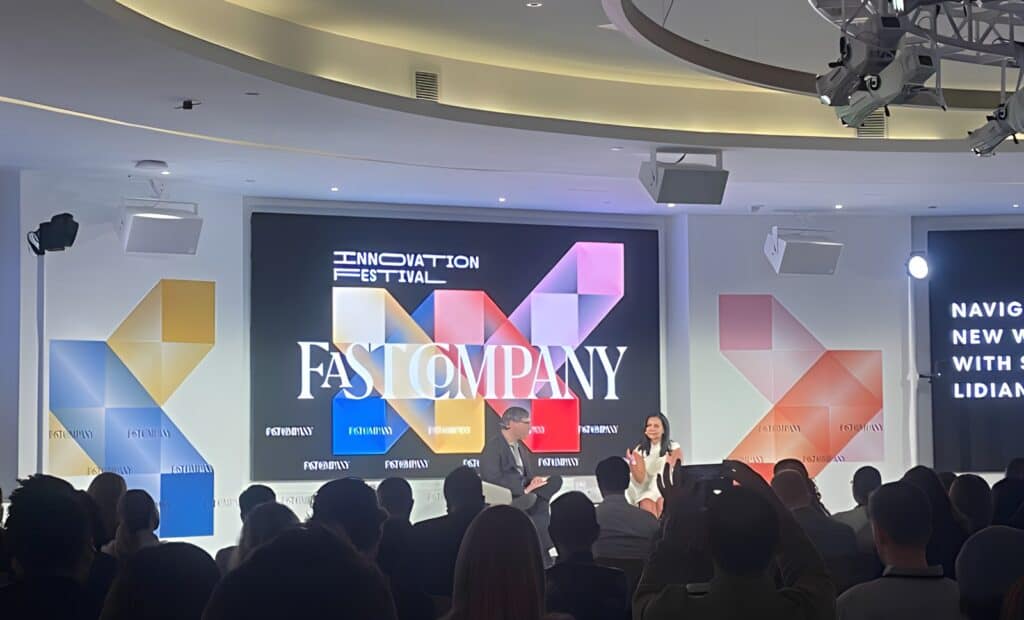
See also: Coachella CEO, Queer Eye star, and Co-founder of Slack join SXSW Sydney
In their continuous path to evolve the way we work, Slack has recently rolled out a number of innovations including new workflow builds, Slack Canvas (a surface for knowledge curation), and a beta for Slack AI. This AI will launch “catch up” functions for users returning to an archival conversation, or even to summarise lengthy active threads.
Naturally, the comparison to ChatGPT came up, to which Jones asserted that the use cases for AI were entirely different.
“That’s what we get compared to, is chat capabilities…
“[However] when we talk to customers that have competitive products, what I have come to realise is that what we’re solving is quite different.
“What we’re solving is this idea that you’re finding new ways of working, that you’re transforming productivity. It’s not just about chat.”
Jones stated in sum, “That’s our team’s primary purpose: are we meaningfully moving the needle and helping our customers?”
See Also: Fast Company Innovation Festival: Hartbeat, Tracee Ellis Ross, Google, Snap Inc., and Airbnb
See Also: Fast Company Innovation Festival: Nike, NBA, Netflix, Dwayne Wade, Halle Berry, e.l.f.
